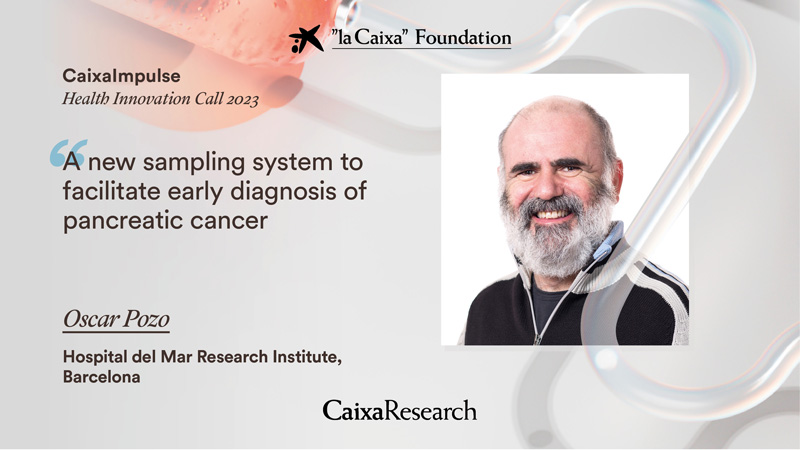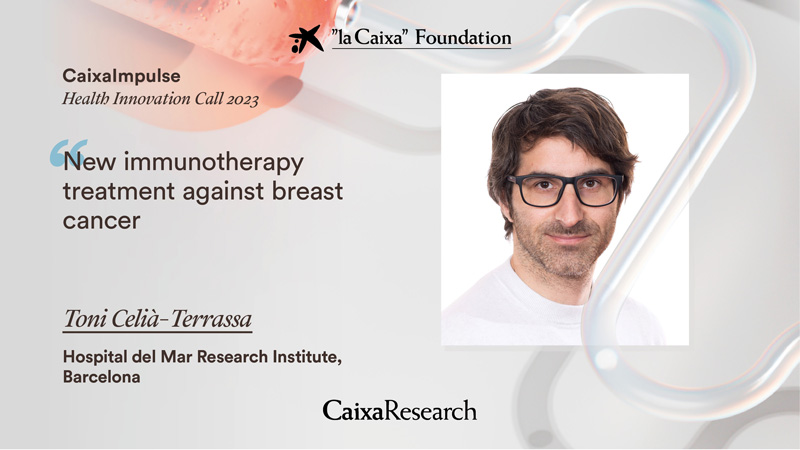
17/10/2023 - Institutional news
The "la Caixa" Foundation will grant more than half a million euros to support two research projects of the Hospital del Mar Research Institute. In total, the foundation will allocate 3.3 million euros to promote 29 innovative biomedical projects with the capacity to reach the market and society. These projects are being developed in 20 research centers, hospitals and universities in Spain and Portugal, and have been selected as part of the 2023 call of the new CaixaImpulse Innovation in Health program.
The aim of this initiative is to encourage research to leave the laboratory and become solutions capable of contributing to improving the health of patients.
The award winners, selected from more than 300 applications, have been evaluated by a panel of international experts and professionals in the field of life sciences and health. In terms of funding, the awardees will receive between 50,000 and 500,000 euros, depending on the degree of maturity of the project, to develop it over the next two years.
CaixaImpulse Innovation provides support to biomedical projects in the field of innovation and transfer, helping researchers to validate their assets and define their exploitation and valorization strategy to bring the projects closer to the market. In addition to financial support, researchers will receive mentoring, consultancy and support from international experts in different areas of the innovation ecosystem. Also, researchers leading projects in phase 2 will receive specialized training for 4 weeks, divided between Barcelona and Madrid, on technology transfer, intellectual property legislation, presentation to investors and closing commercial agreements.
This call is carried out in collaboration with Caixa Capital Risc, one of the leading venture capital investors in Spain, with more than twenty years of experience. Furthermore, in Portugal, the call is carried out in collaboration with the Fundação para a Ciência e a Tecnologia (FCT), of the Portuguese Ministry of Science, Technology and Higher Education, which finances two of the selected Portuguese projects.

New sampling system to facilitate early diagnosis of pancreatic cancer
The project, led by Dr. Óscar Pozo, coordinator of the Applied Metabolomics Research Group, will receive a grant of 50,000 euros and will be developed in consortium with the Institute of Biomedical Research of Girona (IDIBGI).
Early diagnosis followed by complete surgical removal of the tumor is currently the only potentially curative therapy for cancers such as pancreatic cancer. However, there are still no diagnostic tests that are sensitive and specific enough to detect this type of tumor at early stages.
In previous studies, the team has identified a signature of 7 metabolites present in the blood that makes it possible to distinguish between people with pancreatic cancer, even in the early stages, and healthy people or those with chronic pancreatitis. In addition, it has been possible to establish concentration thresholds for each metabolite, which facilitates the clinical interpretation of the analyses.
One of the drawbacks of this new diagnostic system, which makes it difficult to transport to the clinic, is the need to preserve the integrity of the metabolites during transport. Currently, samples are transported frozen. The aim of this project is to simplify sample collection and shipping by using dried blood drop devices, without affecting the sensitivity and reliability of the diagnostic system, so different types of devices will be tested.

New immunotherapy treatment against breast cancer
Project led by Dr. Toni Celià-Terrassa, coordinator of the Cancer Stem Cells and Metastasis Dynamics Research Group. It will receive a grant of 500,000 euros.
Immunotherapy uses the body's immune system to fight cancer, relying on the immune system's ability to recognize and destroy tumor cells. The process depends on the function of immune cells and their ability to detect tumor cells. Molecular mechanisms that alter either of these two aspects lead to immune evasion.
Checkpoint inhibitor-based therapies are successfully used to treat patients with different types of cancer. However, in breast cancer patients, they have shown limited efficacy. Checkpoint inhibitors work by releasing a natural brake on the immune system so that immune cells, called T cells, recognize and attack tumors. These therapies are sometimes called immune checkpoint blockade because the treatment blocks the molecule that acts as a brake on immune cells. One of the main mechanisms of resistance to these types of therapies, reported in all types of cancers, is defects in the ability of immune cells to recognize the antigens present on tumor cells.
The team has developed a new messenger RNA-based nanotherapy that, combined with immunotherapy, activates the body's immune system and facilitates the recognition of antigens present on tumor cells, making them visible and vulnerable, allowing the immune system to recognize and destroy them. The team has validated the efficacy of the therapy in preclinical studies. The objective now is to take all the necessary steps to be able to carry out the first clinical trial in humans; therefore, in this phase the project will focus on validating the safety of the new treatment, both in vitro and in vivo.
Servei de Comunicació:
Marta Calsina Freixas(ELIMINAR)
Tel:
(+34) 93 316 06 80
Doctor Aiguader, 88
08226 Barcelona
© Institut Hospital del Mar
d'Investigacions MèdiquesLegal Notice and Privacy Policy | Cookie Policy | Site Index | Accessibility | Find Us | Contact